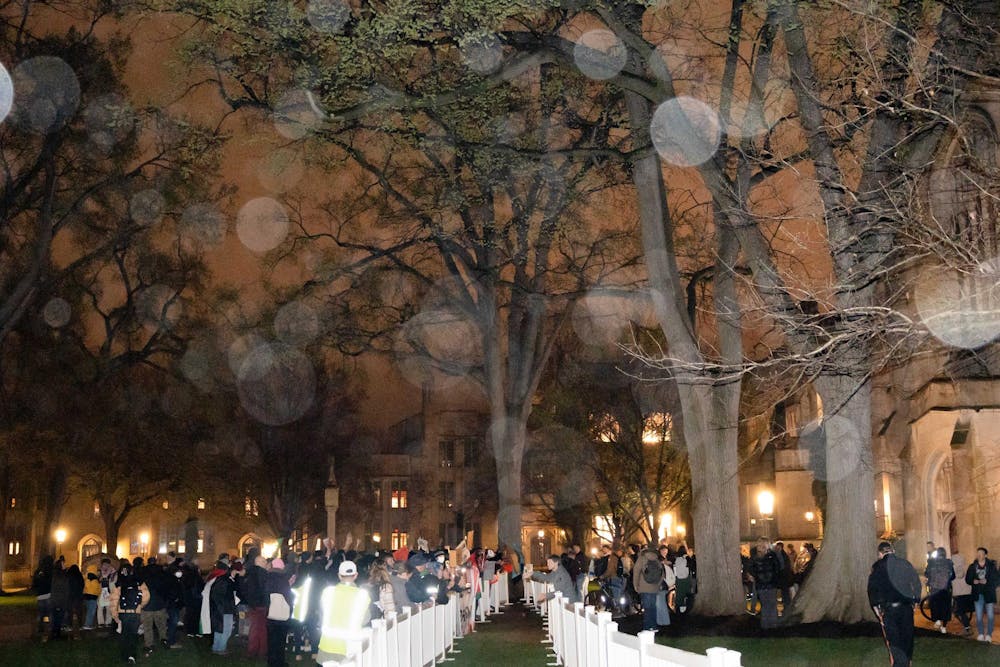The following is a guest contribution and reflects the authors’ views alone. For information on how to submit a piece to the Opinion section, click here.
In a recent Opinion piece, Siyeon Lee and Charlie Yale critiqued a letter from Princetonians for Free Speech (PFS) to entering first-year students that appeared recently in The Princeton Tory, the University’s leading conservative political magazine. In their piece, Lee and Yale questioned why we chose to publish in “a journal that only appeals to a select few on this campus,” and accused us of holding “selective views of free speech.”
To be clear: there is no such thing as free speech for some but not for others. Other than speech that is unprotected by First Amendment law, PFS is committed to defending the widest possible freedom of speech and open discourse for everyone, no matter how unpopular or offensive the point of view.
The Tory gave PFS the opportunity to address issues of free speech, academic freedom, and Princeton’s campus culture. This spring, Antonio Settembrino ’28 recounted in a Tory column his experience as a first-generation first-year student from a blue-collar, Italian-American family who was ostracized at Princeton because of his conservative views. It seemed an appropriate starting point for readers of the Tory.
The Tory’s conservative readership is not a reason for PFS to decide against publishing in its pages. On the contrary, we believe that appearing in student publications across the full spectrum of political viewpoints on campus is essential to our mission.
Lee and Yale also charge that we did not sufficiently champion the free expression rights of international students. We welcome posting articles about the plight of Princeton’s international students from The Daily Princetonian, as we did with Jorge Reyes’ column on protesting for undocumented students, as we did with PAW’s recent powerful article about the impact of government policies on international graduate students. While the second Trump administration has made the situation much more precarious for international students, we have never differentiated between the rights of domestic versus international students in our advocacy of free speech protections. We would love to have international students, or any students for that matter, whose free speech and academic freedom rights have been infringed to contact us and share their stories.
At PFS we try to exemplify and uphold our core principles of nonpartisanship and viewpoint diversity, which is not always an easy task. We count a wide range among our ranks. Our board consists of both Democrats and Republicans and includes Lawrence Haas ’81, who was the Communications Director for Vice President Al Gore and for President Clinton’s Office of Management and Budget; Henry Kennedy Jr. ’70, a retired judge on the U.S. District Court for the District of Columbia appointed by President Clinton, and Edward Yingling ’70, former counsel to Democratic Senator J. William Fulbright, who was the chair of the Senate Foreign Relations Committee.
Our friends and advisors are national leaders in campus free speech advocacy, including the former ACLU executive director and renowned author Nadine Strossen, Jonathan Rauch, author of The Constitution of Knowledge: A Defense of Truth, John Tomasi of Heterodox Academy and Greg Lukianoff of FIRE (Foundation for Individual Rights and Expression). All of these individuals recognize the threat to academic freedom and viewpoint diversity arising both from internal norms that discourage dissent among faculty and students, and from authoritarian external political pressures. PFS has helped bring all of these distinguished speakers to Princeton.

PFS has also issued a list of key internal reform recommendations to Princeton’s leadership, calling for a commitment to institutional neutrality, eliminating academic departments’ use of mandatory DEI statements in faculty hiring, comprehensive student instruction on Princeton’s free speech principles and what they mean in practice, and support for faculty initiatives such as the Princeton Council on Academic Freedom. We also recognize that Princeton and other elite universities face acute dangers imposed by the Trump administration. In short, PFS is opposed to violations of free speech and academic freedom no matter the origin.
PFS has over 16,000 subscribers, the great majority of whom are Princeton alumni whose viewpoints no doubt vary widely. We post and repost articles relevant to our mission that respects and challenges this wide range. The fact that Lee and Yale take strong objection to some of our editorial choices while approving of others, including posts from the ‘Prince,’ means we must be doing something right.
One thing unites our readership: they tend to be very interested in student voices. This is why PFS has a student writing fellow program, which admits two or three applicants each semester and offers a stipend to write for PFS. And we take a special interest in posting relevant articles that appear in the ‘Prince,’ the Tory, or any other publication in which student writing appears.
Whether domestic or international, we care deeply about the large numbers of students who report in many polls, including our own, that they regularly self-censor on important controversial subjects. Their reasons center around fear of offense, reputational damage, negative academic consequences, and doubts that their universities would defend them. They report a culture that rewards conformity and discourages dissent. No matter where you stand, a university culture that leads to self-censorship is, we believe, not conducive to a true education.

We are pleased that Lee and Yale recognize that free speech is “in a precarious place on campus” and that “things like viewpoint diversity are essential.” We reject the accusation that PFS “only stands for one slice” of free speech. While Lee and Yale may take issue with how we accomplish our mission, we stand by our commitment to protect free thought and expression and to achieve a better culture for wide open discourse and free inquiry at Princeton.
Leslie Spencer ’79 is the Vice Chair of Princetonians for Free Speech. Angela Smith is the Executive Director of Princetonians for Free Speech. They may be reached at updates[at]princetonfs.org.
Please send any corrections to corrections[at]dailyprincetonian.com.








